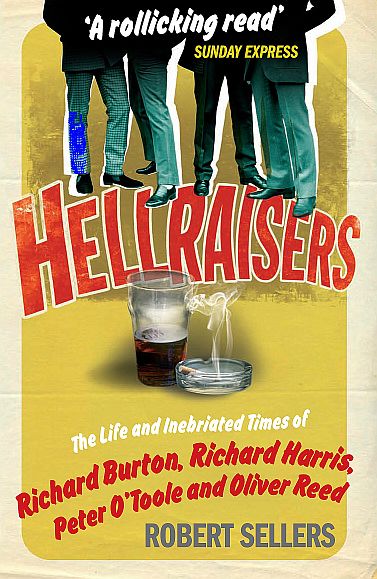First published in 2009, Hellraisers is a fast-paced look at the life and times of four men, Richard Burton, Richard Harris, Peter O’Toole, and Oliver Reed, and an examination of what they all had in common.
First off, they were all talented actors who were at the height of their careers in the 60s and the 70s.
They all first came to prominence in the UK. Peter O’Toole and Oliver Reed were English. Richard Burton was Welsh. Richard Harris was born in Ireland.
With the exception of Oliver Reed, all of them were multiple Oscar nominees but none of them actually won the award.
All four of them could boast filmographies that included some of the best and some of the worst films of all time.
And, of course, all four of them were infamous for their drinking. They were all, if I may borrow the book’s title, famous for raising Hell.
Hellraisers is a frequently entertaining look at their careers and their legendary off-screen exploits. All four of them come across as being very different drinkers. Richard Burton was a depressing drunk, one who drank because he was aware that he was wasting his talents in mediocre films. O’Toole was a drunk who alternated between being charming and being dangerous, someone who was capable of coming across as being a bon vivant even at his lowest moments. Richard Harris was the angry drunk but he was also the one who seemed to have the both the best understanding of why he drank and why, at a certain age, it was necessary for him to cut back. And, finally, Oliver Reed was the showman, the one who viewed drinking a beer the way that others viewed having a cup of tea and who would rather damage his career than allow anyone else to tell him how to live. He knew that he had a reputation and he was determined to live up to it, even at the risk of his own health.
Perhaps not surprisingly, it’s Oliver Reed who dominates the book. There was very little that Reed wouldn’t do while drunk and he was drunk quite a lot of the time. He was also perhaps the most unpredictable of all of the actors profiled in the book, a raw mountain of energy who kept audiences off-balance. Personally, I would not have wanted to have been along in a room with a drunk Oliver Reed. The book has too many stories of Reed dropping his trousers and asking everyone to look at what he called his “mighty mallet,” for the reader to feel totally safe with Reed. At the same time, anyone who has seen a good Oliver Reed performance knows that he deserved better roles than he was often given. (Then again, the book is also honest about the fact that a lot of filmmakers would not work with Reed because they had justifiable reasons to be terrified of him and his erratic nature.) Over the course of the book, Reed comes across as hyperactive, easily bored, and also far more intelligent than most gave him credit for. In many ways, he was a prisoner of his own reputation. He was outrageous because he knew that was what was expected of him. As shocking as some of his behavior seems today, he felt that he was giving the people what they wanted and Hellraisers suggests that he may have been right.
Personally, I don’t drink and I find most heavy drinkers to be tedious company at best. That said, Hellraisers is an interesting book. Burton, Harris, O’Toole, and Reed are all fascinating talents and the book takes a look at how their hellraising reputations both hurt and, in some cases, helped their careers. However, the book is more than just a biography of four actors who drank a lot. It’s also an examination of a different era, of a time when performers were expected to raise Hell and when one could get away with being a contrarian just for the fun of it. One can only imagine what the moral scolds of social media would have to say if Oliver Reed were around today! As a result, this is a book that can be enjoyed by both film lovers and history nerds, like you and me.
